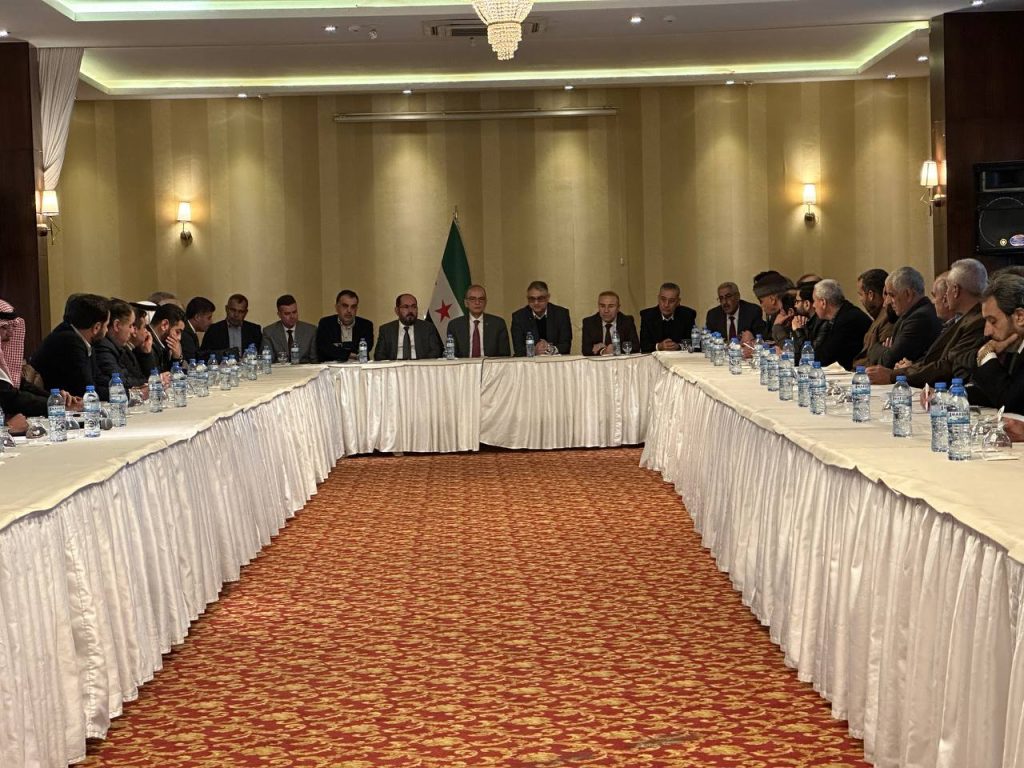President of the Syrian Opposition Coalition (SOC), Hadi Al-Bahra; the President of the Syrian Negotiations Commission, Badr Jamous; the Head of the Syrian Interim Government, Abdurrahman Mustafa; and the Secretary-General of the Syrian Tribal Council, Jihad Maraie, met with representatives of civil, political, and service groups, tribes, and political parties in the Turkish city of Şanlıurfa on Tuesday. The meeting focused on the latest developments on the ground and the political situation in Syria.
The meeting was attended by SOC’s members, ministers of the Syrian Interim Government, members of the Syrian Tribal Council, members of the Association of Independent Syrian Kurds, and members of several Syrian political parties.
Al-Bahra presented a summary of the political situation and the challenges of the next stage. He also explained the SOC’s work plan in the coming period, highlighting full coordination between the institutions of the revolution and the opposition. The action plan focuses on the principle of participatory action, emphasizing the necessity of the contribution of all organizations, associations, and individuals with expertise aiming to improve living conditions in northern Syria.
Al-Bahra emphasized making this plan a success, building upon the Syrian interim government’s previous efforts to achieve a safe and stable environment, encouraging investment, creating job opportunities, and enabling the population to remain on their land.
Al-Bahra stressed the importance of advancing the liberated areas to change the Syrian reality, contributing to restoring international and regional interest in the aspirations of the Syrian people and the goals of the revolution. He also highlighted that advancing conditions in northern Syria will support the political process for implementing UN resolutions, meeting the aspirations of the Syrian people for freedom, dignity, and democracy.
In his briefing, Jamous discussed the latest developments in the political process and the Commission’s efforts to reactivate it. He emphasized the need for unity among the sons and daughters of the Syrian revolution, calling for enhanced cooperation and coordination to change the political reality. Jamous stated that improving the reality of liberated areas and service institutions is crucial to create a force that aids the negotiation process.
Mustafa provided insights into the Syrian interim government’s work, emphasizing its focus on securing the basic components for achieving security and stability, including the independence of the judiciary. Mustafa highlighted progress in the interim government’s work despite limited resources, citing sustainable projects and developments in ministries and directorates within civil administration and governance.
Maraie explained the Syrian Tribal Council’s role in contributing to the implementation of these plans and the living reality in liberated areas.
During the meeting, attendees raised questions about the SOC’s role in resolving issues of Syrian refugees in Türkiye and other host countries. They also inquired about the judiciary’s ability in liberated areas to hold perpetrators of abuses and violations accountable, and the need to support the capabilities of the Ministry of Defense in the Syrian Interim Government to end infighting through the military police and military judiciary.
Attendees stressed the necessity of achieving this national project for all Syrians, providing an opportunity for all national figures and organizations to collaborate and ensure its success.
(Source: SOC’s Media Department)














